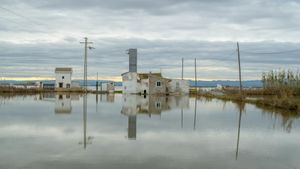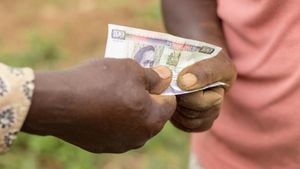The COP29 climate talks kicked off on November 11, 2024, amid mounting concerns about the challenges facing global climate diplomacy. The conference, held in Baku, Azerbaijan, opened its doors under the significant shadow of Donald Trump’s recent re-election as President of the United States. Trump's history of dismissing climate change and pledging to withdraw from the Paris Agreement sent ripples of anxiety through the assembled delegates, who were tasked with addressing the urgent need for climate financing for developing nations.
With nearly 200 countries represented at this two-week summit, the primary focus was to negotiate increasing the existing target of $100 billion per year aimed at helping poorer nations combat the impacts of climate change. The urgency of these discussions has escalated, especially with new reports indicating 2024 is set to exceed historical temperature records. This scenario adds pressure to policymakers attempting to balance economic interests with the urgent need to tackle climate change.
The opening day was marked by stark warnings from officials about the dire state of global climate commitments. Simon Stiell, the UN's climate chief, called for ambitious goals to be set on providing climate funding, making it clear: "Let’s dispense with any idea that climate finance is charity." The sentiment echoed concerns from other leaders, including COP29 president Mukhtar Babayev, who called this juncture “a moment of truth” for the Paris Agreement amid deadly climate-related disasters recently experienced, including flooding events across Europe.
Babayeav described the urgent need for collaboration as fundamental, stating, “Countries come to Baku after new warnings... we are on the road to ruin,” highlighting the immediate need not just for financial commitments but genuine cooperation among nations. Delegates underscored the necessity of significantly increasing the climate finance target, with developing nations demanding trillions of dollars to effectively respond to climate impacts and transition away from fossil-fuel-dependent economies.
Trump’s election added layers of complexity to these discussions. His earlier withdrawal of the U.S. from the Paris Agreement triggered fears among global leaders about diminishing ambition during negotiations. Vanuatu's special envoy for climate and environment, Ralph Regenvanu, stressed the importance of not letting the momentum for international climate action falter. “We cannot afford to let the momentum for global action on climate change be derailed,” he stated, reinforcing the idea of climate change as a collective problem requiring collaboration to address.
Despite the gravity of the discussions, many notable leaders were absent from the summit, including Joe Biden, creating concerns about the pressure needed to engage constructive dialogue. Though only a few leaders from the Group of 20—whose countries contribute significantly to global emissions—were present, notable participation came from Afghanistan, which sent its first delegation since the Taliban took over, albeit with observer status.
Diplomats remained optimistic, insisting these absences would not impede the core objectives of the conference. The necessity of achieving consensus on climate financing was emphasized repeatedly. Discussion points included not only the amounts funded but also who should be responsible for contributing. The narrative from developing countries surfaced consistently, with many representatives advocating for funding structures richer economies must support, ideally through grants rather than loans.
Adonia Ayebare, the Ugandan chair of the bloc consisting of over 100 developing nations and China, frankly acknowledged the challenges of negotiating funding, asserting, “It’s hard. It involves money. When itcomes to money, everybody shows their true colors.” Trump’s earlier dismissal of climate facts posed additional barriers; yet Ayebare downplayed his potential impact, noting historical precedents allowed for adaptation following earlier U.S. withdrawals. “This has happened before; we will find a way of realigning,” he assured attendees.
Among the divisions between contributing nations and developing counterparts are disagreements over the approach to funding. Developing countries are advocating for access to larger sums, framed as grants, which represent more favorable retrieval models than loans. Without significant financial support, poorer nations fear they will struggle to meet necessary climate goals due early the following year. Evans Njewa, chair of the Least Developed Countries Climate Group, which includes 1.1 billion people, pressed for decisive financial commitments, saying, “Bring some money to the table to show your leadership.”
On the flip side, wealthier nations contributed significantly less than anticipated, contributing to growing frustration among developing nations for what they perceive as inadequate support. Demanding more inclusivity, countries were insistent on funding coming from top global emitters—highly debated participants like China and various Gulf states. A representative from China asserted during closed-door sessions cautioning against attempts to renegotiate existing climate agreements. Liang Pei, from China’s Ministry of Ecology and Environment, encouraged collective and constructive engagement among all participants tackling the climate crisis.
Attention turned to the prospect of climate action as the summit unfolded. The UN and EU had underscored the pressing need for significant changes, with the World Meteorological Organization announcing the decade of 2015-2024 would be the hottest period documented to date. Discussions brought forth the stark reality of the climate agreement’s goals being “in great peril.” The world stands at risk of overshooting the upper limits of the Paris Agreement, which hopes to sustain warming below 2 degrees Celsius and ideally maintains levels beneath 1.5 degrees Celsius.
“We know the needs are in the trillions, but there are different views on how to achieve those goals,” asserted Babayev, emphasizing differing perspectives on how to mobilize public sector investment, termed by many as potentially reaching “hundreds of billions” as opposed to the trillions projected by developing states. Even with significant discussions surrounding financial aspects dominating the agenda, leaders at COP29 echoed their commitments to mitigating climate change. German Foreign Minister Annalena Baerbock remarked, “But they are worth it: each tenth of a degree of warming avoided means fewer crises, less suffering, less displacement.”
Over 51,000 individuals were expected to join the talks running from November 11 to 22, making it one of the largest climate gatherings to date. Participants were tasked not only with mobilizing future funding but devising actionable paths forward amid spiraling climate consequences already felt by communities globally. The backdrop, featuring Azerbaijan’s reliance on fossil fuels, is stark—this irony not lost on observers watching how countries hosting significant climate events manage internal policies reflective of their national scenarios. Azerbaijan has faced serious criticisms concerning its governmental repression and limiting independent media, producing complex dynamics under which climate negotiations now transpire.
Coinciding with the tension surrounding funding needs and policy negotiations, the sidelining of key U.S. leadership invoked fears of lost opportunities for effective alliances on issues demanding immediate attention. Moving forward, the fate of climate finance and diplomatic efforts could hinge on how effectively nations redirect their priorities toward collective solutions. Delegates convening during COP29 are left with the monumental task of ensuring cooperation transcends individual national interests for the sake of establishing enduring strategies against climate change.



